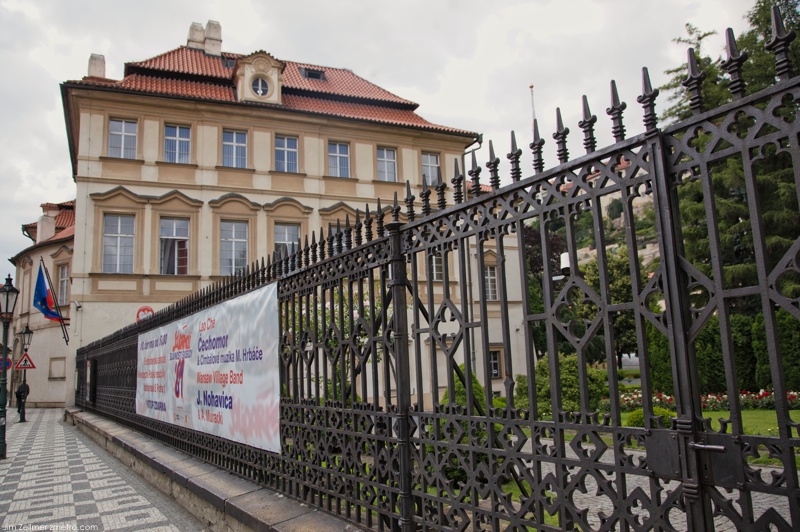



Category: Current Events
Prayers for Poland, Again

Poland’s Embassy in Prague; June, 2009. The banner celebrates the 20th anniversary of the Wall coming down.
Many links on the tragic plane crash in Smolensk. Clusty Search: Katyn film and Solidarity Poland.
Energy Secretary Chu provides an optimistic view of our energy future at EIA conference
Energy Secretary Chu gave a talk at the EIA/SAIS Energy Conference on April 6-7. I want to share a few highlights of it, and give my impression. Both the Powerpoint slides and audio can be accessed at this link.
My general view of the talk is that Chu is extremely optimistic, in terms of what he thinks can be done. He also fails to tell listeners what our real problems are.
Wow! Slide 2 indicates that Chu thinks America has the opportunity to lead the world in a new industrial revolution. How does he think that is going to be done?
The first industrial revolution was during a time of increasingly available energy, because of the new use of coal. That is very unlikely in the future, both because of peak oil, and because of hoped-for constraints on fossil fuel use because of climate change issues. Net energy available to society is likely to be going down, not up! It is hard to understand an industrial revolution under those circumstances, unless it is a retooling to a much lower level–but later slides make it clear that is not what he is thinking of.
The Europe roundup: Iceland, from the financial crisis to open data
Iceland | From the financial crisis to open data
In 2008 in Iceland the financial system imploded. “Not surprisingly, this has led to a demand for more transparency, more access to public data and more effective communication by the government. All of a sudden Open Data is seen as a high priority among various lobby groups, branches of government and in restoration planning” says Hjalmar Gislason, an open data activist and member of the Open Knowledge Foundation’s Working Group on EU Open Data. In a long and detailed post, Gislason explains how this is not just part of the “momentum” open data is gaining in Europe, but a further step in a path that started in late ’90s.
The Icelandic Modern Media Initiative and the presence of Wikileaks surely have a positive impact on the whole scenario and there is no doubt they will help boosting any future open data bill. The effects will be seen soon: “In December a rare cross-party parliamentary proposal (the first step in passing new legislation) was made, proposing a “default open” strategy for any public sector data. The Prime Minister’s Office has formed a committee that is to propose changes and improvements in legislation and suggest how to define the boundaries between data that is to be open and data that shall remain closed.”
German Government Minister’s Letter to Facebook
German Consumer Protection Minister Ilse Aigner:
Dear Mr. Zuckerberg,
I was astonished to discover that, despite the concerns of users and severe criticism from consumer activists, “Facebook” would like to relax data protection regulations on the network even further. Your current privacy policy states that in future user data is to be automatically passed on to third parties. These parties are supposed to comprise previously vetted operators of websites and applications. Anyone who does not want this to happen must take action themselves and use the opt-out function.
I use the Internet every day, both professionally and privately, and am a member of several social networks, including Facebook. Social networks are an enrichment and it is difficult to imagine our lives without them. Networks such as Facebook link millions of people across national boundaries, and it is for this very reason that particular importance must be attached to protecting privacy. As you know, I, in my capacity as Federal Minister of Consumer Protection, am striving to ensure that personal data on the Internet is protected. Private information must remain private – I think that I speak for many Internet users in this respect. Unfortunately, Facebook does not respect this wish, a fact that was confirmed in the most recent study by the German consumer organisation “Stiftung Warentest”. Facebook fares badly in this study. Facebook was graded as “poor” in respect of user-data policy and user rights. Facebook also refused to provide information on data security – it was awarded a “5” (= poor) in this category as well.
It is therefore all the more astounding that Facebook is not willing to eliminate the existing shortcomings regarding data protection, but is instead going even further. Decisions such as this will not engender trust in an enterprise in the long term.
What Does Greece Mean to You?
“To trace something unknown back to something known is alleviating, soothing, gratifying and gives moreover a feeling of power. Danger, disquiet, anxiety attend the unknown – the first instinct is to eliminate these distressing states. First principle: any explanation is better than none… The cause-creating drive is thus conditioned and excited by the feeling of fear…” Friedrich Nietzsche
“Any explanation is better than none.” And the simpler, it seems in the investment game, the better. “The markets went up because oil went down,” we are told, except when it went up there was another reason for the movement of the markets. We all intuitively know that things are far more complicated than that. But as Nietzsche noted, dealing with the unknown can be disturbing, so we look for the simple explanation.
“Ah,” we tell ourselves, “I know why that happened.” With an explanation firmly in hand, we now feel we know something. And the behavioral psychologists note that this state actually releases chemicals in our brains that make us feel good. We become literally addicted to the simple explanation. The fact that what we “know” (the explanation for the unknowable) is irrelevant or even wrong is not important to the chemical release. And thus we look for reasons.
How does an event like a problem in Greece (or elsewhere) affect you, gentle reader? And I mean, affect you down where the rubber hits your road. Not some formula or theory about the velocity of money or the effect of taxes on GDP. That is the question I was posed this week. “I want to understand why you think this is so important,” said a friend of Tiffani. So that is what I will attempt to answer in this week’s missive, as I write a letter to my kids trying to explain the nearly inexplicable.
Hiroshima, Nagasaki: You Are There. A talk by Seymour Abrahamson
Seymour Abrahamson spoke at a recent meeting of the Madison Literary Club.
17.9MB PDF Handout
“One Google, One World; One China, No Google”
China’s insomniac twitterati were on fire this afternoon U.S. time, powered no doubt by much caffeine and sugar in the the wee hours of the morning in China. Half an hour before Google’s David Drummond posted his announcement that Google.cn is now effectively operating from Google.com.hk, Guangzhou-based open source programmer @LEMONed broke the news that google.cn was being redirected to the Hong Kong service. Reacting to the news, @wentommy quipped: “One Google, One World; One China, No Google.”
As of now (still early morning in Beijing), Google.com.hk is accessible from mainland China although specific search results for sensitive terms result in a browser error – or in other words, are blocked. Same as it’s always been for sensitive searches on Google.com from inside mainland China. This is network filtering and would happen automatically as part of the “great firewall” Internet filtering system.
The ball is now in the Chinese government’s court in two ways:
1) Whether they will block all of google.com.hk, which until now has not been blocked. If they are smart they will just leave the situation as is and stop drawing media attention to their censorship practices. The longer this high profile fracas goes on, the greater Chinese Internet users awareness will be about the lengths to which their government goes to blinker their knowledge of the world. That may inspire more people to start learning how to use circumvention tools for getting around the censorship. Chinese censorship is only effective if a large percentage of the population isn’t very conscious of what they’re missing. As I like to explain it: if you’re born with tunnel vision you assume it’s normal until somehow you’re made aware that life without tunnel vision is both possible and much better. The longer this story remains in the headlines, the more people will become conscious of their tunnel vision and think about ways to eliminate it.
Old-school architect creates an iOpener
A taxi pulled up to Apple’s Fifth Avenue store one recent morning, and while the meter was running a pair of tourists dashed out to have their photos taken near the entrance, a glass cube of such incorporeal lightness that it seems in danger of floating away.
Had those architectural pilgrims arrived a minute later, they might have noticed a 70-ish man in a rumpled blue blazer struggling to balance an overpacked briefcase on a rolling suitcase. He was hatless, coatless, and tieless, and his shirt pocket was weighed down by a fistful of fine Japanese pencils.
It was the prizewinning Pennsylvania architect Peter Bohlin, stopping by to kick the tires on his little creation, which he first sketched for Apple chairman Steve Jobs using one of his ever-present Itoya pencils. Told that tourists had photographed it with their iPhones, Bohlin chuckled and said, “I hear that happens a lot.”
Barely four years after Apple opened the store in the basement of the General Motors tower, Bohlin’s ethereal one-story structure – a glorified vestibule, really – has become a must-see attraction as well as Apple’s highest-grossing location. According to Cornell University scientists who analyzed 35 million Flickr images, the Cube is the fifth-most-photographed building in New York, the 28th worldwide.
Making Sense of Privacy and Publicity
Let me begin by saying that I’m tremendously honored to be here doing the welcoming keynote at SXSW. I have a huge feeling of warmth whenever I think about SXSW. Part of this is deeply personal – I met my soulmate here. I have met countless friends here. And made more professional connections than I can possibly enumerate. Walking down Red River fills me with a flash of fun memories.
What’s powerful about SXSW is first and foremost the people. From there, the content spills out beautifully. But as we think of the power of this conference to bring people together, I want to expressly call out the amazing work of Hugh Forrest, your fearless organizer. Hugh has done a phenomenal job of bringing diverse groups here to Austin to engage with one another. And for that, I’m eternally grateful.
For those of you who are old-timers, you know how special this conference is. For those of you who are new here, you’re going to have a fantastic time! Just one bit of advice: beware of the tequila and, especially, of any future colleagues who may offer you tequila.